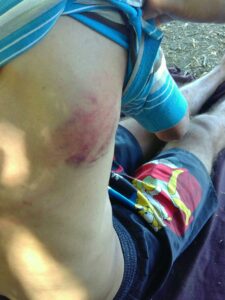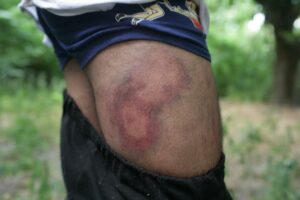On the occasion of Human Rights day on the 10th of December, German organization Rigardu is releasing an extensive report of illegal push-backs and police violence against refugees and migrants at the borders of the European Union with Serbia: www.borderviolence.eu.
« One of us, a 13-year old boy couldn’t stop crying because of the gas so they moved him from the front to the back of the line, so he was sitting next to me. He kept crying and they were laughing at him and hitting him with police batons saying: Shut up! Shut up! »
It was statements such as the one above that first made us aware of incidents of extreme police violence. In our work at different locations in Serbia, we started to notice the effects of push-backs and, increasingly, physical violence on more and more of the people we were working with. Since we started documenting cases of violence on the border, the frequency of such incidents has been ever rising and the level of violence has reached shocking levels. In solidarity with the people suffering these abuses we decided to document and publish their stories, which are all too often forgotten.
By means of photos and witness reports, we are now able to provide proof of more than 120 cases in which Croatian and Hungarian police illegally deported refugees to Serbia in 2017 alone. At least 857 people including many under-aged have suffered beating, kicking, electric shocks and even dog bites, were deprived of their belongings including their clothes, and forced to wait for hours at below-zero temperatures. The first in-depth documentation of individual cases shows to what extent illegal push-backs accompanied by police violence have become daily fare on the mentioned EU borders. With many occurrences undocumented, the actual number of cases is likely to be much higher.
« They begged them not to be deported, that they had a baby, that they wanted to ask for asylum in Croatia. She also explained that her mother has a heart problem. But the police didn’t listen, and they were driven back to Serbia, and dropped at the border around midnight. It was the second time they were pushed back. »
Although illegal push-backs are taking place throughout South-Eastern Europe, this database concentrates mostly on cases in Croatia and Hungary, since these are where most of our testimonies come from. While there have been many attempts to raise attention for this issue by actors such as MSF, Oxfam, Human Rights Watch, UNHCR and others [1], illegal and violent push-backs are still taking place today.
« Then everyone had the dogs released on them again. When we were trying to back off to escape the dogs, police officers were on the other side of us, kicking us back towards the dogs. This was repeated several times. In the meantime, some policemen were drinking tea in the car observing and laughing at us. »
The goal of this platform is the large-scale documentation of border violence inflicted by officials of EU member states. It aims to unite as many reports as possible under one roof, thus rendering the systematic and planned character of this violence visible. The regularity of the incidents and similarity in procedures allow no conclusion other than that this is a deliberate and systematic line of action of the responsible authorities and supported by political decision-makers.
« They were asking: Where is the rest of your group? and he didn’t know. They grabbed him and smashed his head against the ground breaking his teeth. Blood was coming out of his ears and from his nose. His mouth was cut where the teeth had been broken. When they dropped us in Serbia he was done, he couldn’t move. »
Push-Backs and police violence violate international law, in particular the Geneva Convention, The European Charter of Human Rights and, essentially, Article 14 of the Universal Declaration of Human Rights.
Rigardu as an actor of civil society calls on the responsible state actors – especially in Croatia and Hungary, but also in Serbia and Slovenia – to bring violence against refugees and migrants, illegal push-backs and the denial of the right to asylum to an end. Responsibility for these direct consequences of the European politics of isolation lies also with the political players of the European Union and the governments of all member states.


Given that all European countries have agreed to the Geneva Convention as well as the Charter of Fundamental Rights of the European Union, it is their shared responsibility to impede the systematic violation of those treaties. Instead, the various measures taken to close the Balkan corridor are widely celebrated as successful and decreasing arrival numbers in central European countries are being portrayed by politicians as the results of effective European policy-making. However, what is not mentioned is how this new regime drives more and more people fleeing from war and persecution in their home countries into the arms of smugglers and violent border guards and forces them onto more and more dangerous routes – sometimes with deadly consequences [2].
Written by Max
[1] Médecins sans frontières (03.10.2017): GAMES OF VIOLENCE, unaccompanied children and young people repeatedly abused by EU member state border authorities; http://www.msf.org/sites/msf.org/files/serbia-games-of-violence-3.10.17.pdf
UNHCR (2016): UNHCR Concerned Hungary Pushing Asylum Seekers Back to Serbia. http://www.unhcr.org/news/latest/2016/7/5788c85a4/unhcr-concernedhungary-pushing-asylum-seekers-serbia.html
Are You Syrious/Welcome Initative (05.03.2017): REPORT ON THE NEW WAVE OF VIOLENCE AGAINST REFUGEES ON CROATIAN BORDERS http://welcome.cms.hr/wp-content/uploads/2017/05/REPORT-ON-THE-NEW-WAVE-OF-VIOLENCE-AGAINST-REFUGEES-ON-CROATIAN-BORDERS.pdf
Oxfam (06.04.2017): A Dangerous ‘Game’ https://www.oxfam.org/sites/www.oxfam.org/files/file_attachments/bp-dangerous-game-pushback-migrants-refugees-060417-en_0.pdf
Human Rights Watch (2017): Croatia: Asylum Seekers Forced Back to Serbia. https://www.hrw.org/news/2017/01/20/croatia-asylum-seekers-forced-back-serbia



0 Comments